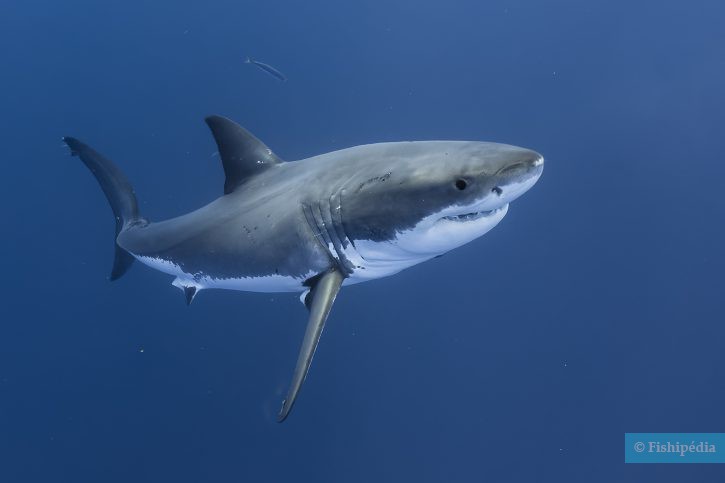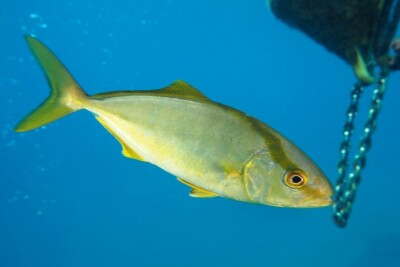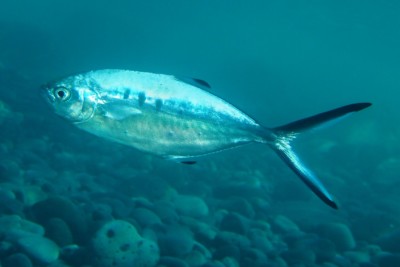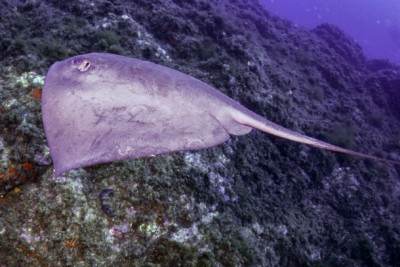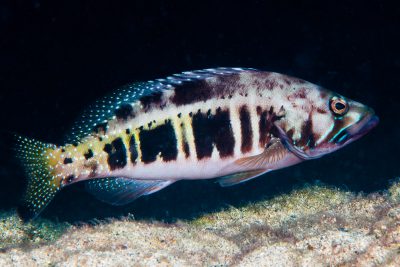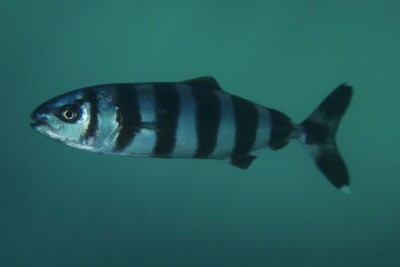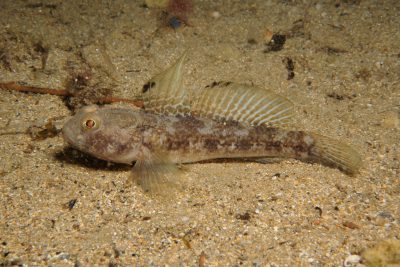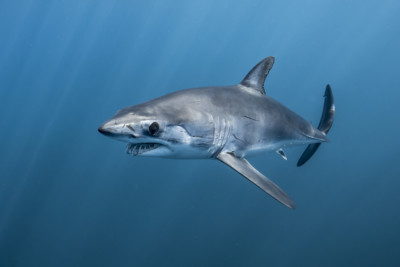white shark
| Scientific name | Carcharodon carcharias |
|---|---|
| Descriptor | Carl von Linné |
| Year of description | 1758 |
| IUCN category (World) | VU |
| Family | Lamnidae |
| Genus | Carcharodon |
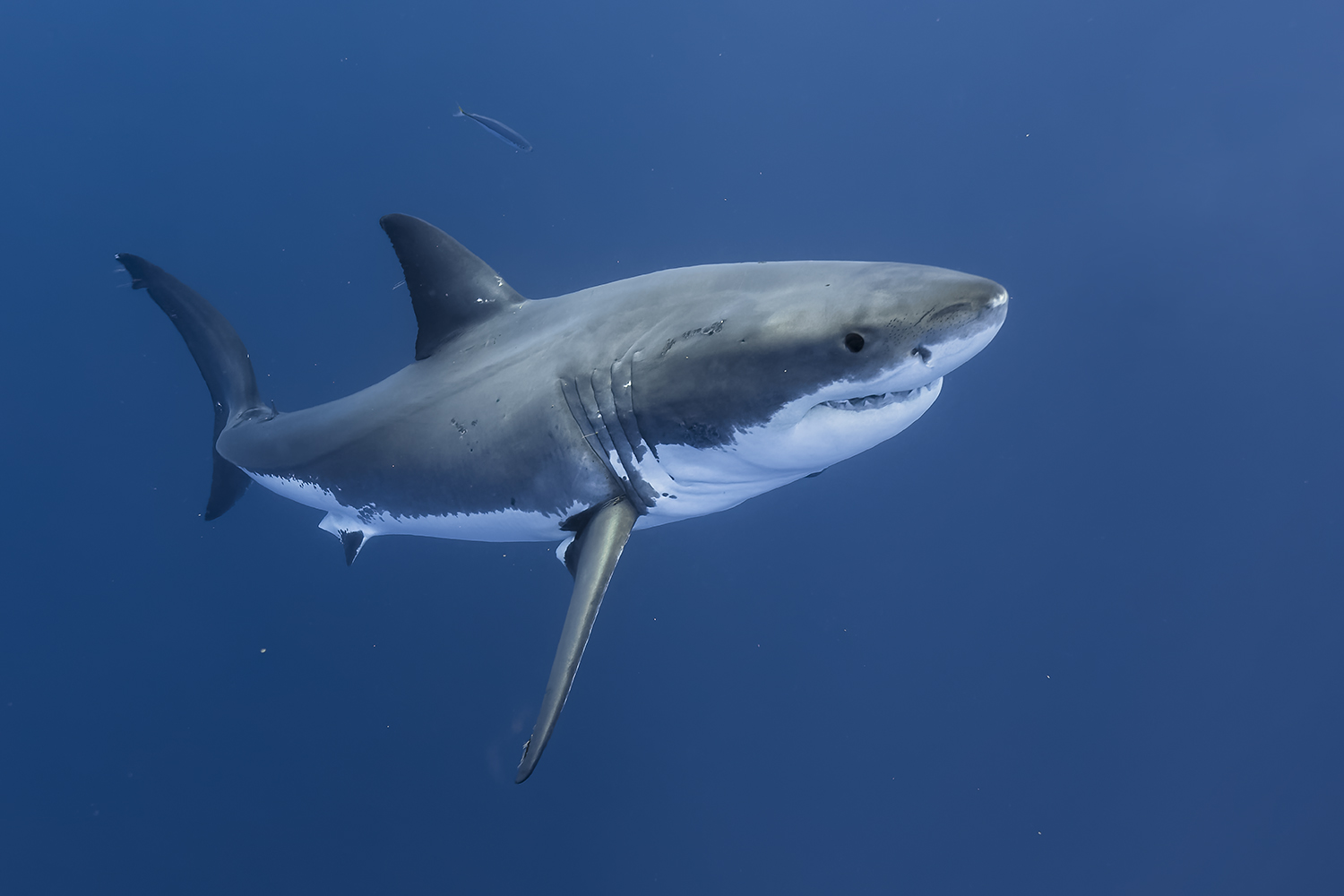

Introduction
The white shark can be found in the coastal and oceanic waters of most temperate and sub-tropical oceans and seas around the globe.
First described in 1758 by Carl Linnaeus under the name Carcharodon carcharias, it became popular thanks to the novel "Jaws" by Peter Benchley, adapted to cinema by Steven Spielberg.
Who is it?
Morphology
-
Type
-
Average size450 cm
-
Maximum size750 cm
-
Longevity40 year
-
ShapeRectangular
-
Type
-
Average size450 cm
-
Maximum size750 cm
-
Longevity40 year
-
ShapeRectangular
How to recognize This fish ?
The back is gray and the belly is white, hence its name. The teeth are flat, triangular, and serrated, and about 5 cm in length in adult individuals.
It has a heterocercal tail (high aspect ratio between height and length), which provides most of its propulsion capacity.
Behaviour & Life cycle
-
dietcarnivorous
-
Sociabilitysolitary
-
territorialNo
-
Way of livingdiurnal
The white shark is a solitary predator feeding on bony fish, other sharks and rays, and marine mammals. It is also an opportunist that can scavenge on whale carcasses in cold waters.
The white shark has a highly developed visual sense, giving it an observant and curious nature towards objects and activities.
Reproduction
-
Reproductionovovivipare
-
Migratory speciesYes
Sexual maturity in white sharks occurs around 12-17 years in females and 7-9 years in males. The aplacental viviparous gestation, with oophagy (young feeding on unfertilized eggs in the mother's belly), lasts about 18 months.
The female gives birth to around ten young exceeding one meter in length, avoiding predation risks.
Life-threatening species
-
VenomousNo
-
BiteYes
White sharks are powerful animals that can inflict deadly injuries on humans. Most attacks occur on surfers, with the surfboard potentially being mistaken for a sea turtle or seal.
Although spectacular, these accidents remain rare and exceptional.
Origin and distribution

Geographic distribution & Conservation
Knowledge about shark populations and their exploitation is imprecise. However, several indicators (decreasing catches, decreasing yields) paint a fairly grim picture of their stocks, although situations vary from one species to another.
The white shark (Carcharodon carcharias) has been listed in Appendix II of CITES since 2004.
Conservation status of populations (IUCN)
What is its habitat?
Natural environment characteristics
-
Depth0 - 1200 m
-
EnvironmentActive pelagic
Biotope presentation
The white shark inhabits shallow waters, but can dive to depths of up to 1200 meters. It is often found near sandy or rocky shores.
Although it is attracted to estuaries for hunting, it does not frequent brackish and fresh waters, and unlike some of its relatives, it is never seen in coastal rivers.
Species of the same biotope
Fishkeeping
Not recommended
We do not recommend keeping this species in an aquarium. It has unpredictable needs which, if not met, generate significant stress, potentially leading to a shorter life expectancy, an interruption of its growth or the development of pathogens.
To go further
Sources & Contributions
Participation & Validation
The Fishipedia team and specialist contributors are committed to providing high-quality content. However, although the information comes from scientific sources or testimonials from specialists, the cards may contain inaccuracies.

Adrien Falzon

Benoit Chartrer

Yuhei Nakata

Silvia Gomez
Translation
Translation done with the valuable contribution of our translators, who make this information available to a wider audience. We sincerely thank them for their commitment.
Scientific partners
Tags
#Lamnidae
#Carcharodon
#estuaire
#plein eau
#récifs extérieurs
#shark
#Gulf of Mexico
#Tasman Sea
#Sea of Japan
#Mediterranean Sea
#Océan Atlantique Est Afrique - Angulhas
#Océan Atlantique Est Afrique - Bengala
#Océan Atlantique Est Afrique - Golfe de guinée
#Temperate Eastern Atlantic Ocean
#Océan Atlantique Est Afrique - Transition & Cap Vert
#Cold temperate Northwest Atlantic Ocean
#Northwest warm temperate Atlantic Ocean
#Eastern tropical Atlantic Ocean
#western Indian Ocean
#Océan Pacifique Nord Est Tempere Chaud
#Océan Pacifique nord-est tempéré froid
#Océan Pacifique sud-est tempéré chaud
#Canary Islands
Species of the same family
Species of the same biotope
